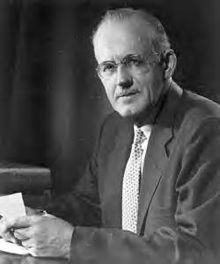CHAPTER 12 The Omnipotence of God
Our Heavenly Father, we have heard Thee say, “I am the Almighty God; walk before me, and be thou perfect.” But unless Thou dost enable us by the exceeding greatness of Thy power how can we who are by nature weak and sinful walk in a perfect way?
Grant that we may learn to lay hold on the working of the mighty power which wrought in Christ when Thou didst raise Him from the dead and set Him at Thine own right hand in the heavenly places. Amen.
In the time of his vision John the Revelator heard as it were the voice of a great multitude and as the voice of many waters and as the voice of mighty thunderings sounding throughout the universe, and what the voice proclaimed was the sovereignty and omnipotence of God: “Alleluia: for the Lord God omnipotent reigneth.
Sovereignty and omnipotence must go together. One cannot exist without the other. To reign, God must have power, and to reign sovereignly, He must have all power. And that is what omnipotent means, having all power. The word derives from the Latin and is identical in meaning with the more familiar almighty which we have from the Anglo-Saxon. This latter word occurs fifty-six times in our English Bible and is never used of anyone but God. He alone is almighty.
God possesses what no creature can: an incomprehensible plenitude of power, a potency that is absolute. This we know by divine revelation, but once known, it is recognized as being in full accord with reason. Grant that God is infinite and selfexistent and we see at once that He must be all-powerful as well, and reason kneels to worship before the divine omnipotence.
“Power belongeth unto God,” says the psalmist, and Paul the apostle declares that nature itself gives evidence of the eternal power of the Godhead (Rom 1:20). From this knowledge we reason to the omnipotence of God this way: God has power. Since God is also infinite, whatever He has must be without limit; therefore God has limitless power, He is omnipotent. We see further that God the self-existent Creator is the source of all the power there is, and since a source must be at least equal to anything that emanates from it, God is of necessity equal to all the power there is, and this is to say again that He is omnipotent.
God has delegated power to His creatures, but being self-sufficient, He cannot relinquish anything of His perfections and, power being one of them, He has never surrendered the least iota of His power. He gives but He does not give away. All that He gives remains His own and returns to Him again. Forever He must remain what He has forever been, the Lord God omnipotent.
One cannot long read the Scriptures sympathetically without noticing the radical disparity between the outlook of men of the Bible and that of modern men. We are today suffering from a secularized mentality. Where the sacred writers saw God, we see the laws of nature. Their world was fully populated; ours is all but empty. Their world was alive and personal; ours is impersonal and dead. God ruled their world; ours is ruled by the laws of nature and we are always once removed from the presence of God.
And what are these laws of nature that have displaced God in the minds of millions? Law has two meanings. One is all external rule enforced by authority, such as the common rule against robbery and assault. The word is also used to denote the uniform way things act in the universe, but this second use of the word is erroneous. What we see in nature is simply the paths God’s power and wisdom take through creation. Properly these are phenomena, not laws, but we call them laws by analogy with the arbitrary laws of society.
Science observes how the power of God operates, discovers a regular pattern somewhere and fixes it as a “law.” The uniformity of God’s activities in His creation enables the scientist to predict the course of natural phenomena. The trustworthiness of God’s behavior in His world is the foundation of all scientific truth. Upon it the scientist rests his faith and from there he goes on to achieve great and useful things in such fields as those of navigation, chemistry, agriculture, and the medical arts.
Religion on the other hand, goes back of the nature of God. It is concerned not with the footprints of God along the paths of creation, but with the One who treads those paths. Religion is interested primarily in the One who is the source of all things, the master of every phenomenon. For this One philosophy has various names, the most horrendous that I have seen being that supplied by Rudolph Otto: “The absolute, the gigantic, never-resting active world stress.” The Christian delights to remember that this “world stress” once said “I AM” and the greatest teacher of them all directed His disciples to address Him as a person: “When ye pray, say, Our Father which art in heaven, Hallowed be thy name.” The men of the Bible everywhere communed with this “gigantic absolute” in language as personal as speech affords, and with Him prophet and saint walked in a rapture of devotion, warm intimate and deeply satisfying.
Omnipotence is not a name given to the sum of all power, but an attribute of a personal God we Christians believe to be the Father of our Lord Jesus Christ and of all who believe on Him to life eternal. The worshipping man finds this knowledge a source of wonderful strength for his inner life. His faith rises to take the great leap upward into the fellowship of Him who can do whatever He wills to do, for whom nothing is hard or difficult because He possesses power absolute.
Since He has at His command all the power in the universe, the Lord God omnipotent can do anything as easily as anything else. All His acts are done without effort. He expends no energy that must be replenished. His self-sufficiency makes it unnecessary for Him to look outside of Himself for a renewal of strength. All the power required to do all that He wills to do lies in undiminished fullness in His own infinite being.
The Presbyterian pastor A. B. Simpson, approaching middle age, broken in health, deeply despondent and ready to quit the ministry, chanced to hear the simple Negro spiritual,
Nothing is too hard for Jesus,
No man can work like Him.
Its message sped like an arrow to his heart, carrying faith and hope and life for body and soul. He sought a place of retirement and after a season alone with God arose to his feet completely cured, and went forth in fullness of joy to found what has since become one of the largest foreign missionary societies in the world. For thirty-five years after this encounter with God, he labored prodigiously in the service of Christ. His faith in God of limitless power gave him all the strength he needed to carry on.
Almighty One! I bend in the dust before Thee;
Even so veiled cherubs bend;
In calm and still devotion I adore Thee,
All-wise, all-present friend
Thou to the earth its emerald robe hast given,
Or curtained it in sow;
And the bright sun, and the soft moon in heaven,
Before Thy presence bow.
Sir John Bowring

Follow Us On
Latest Posts
- Thankfulness walk without offence
- Spiritual blindess - Thankfulness
- Bill Johnson on worship
- The Pursuit of God - AW Tozer Chapter - Chapter 10
- The Pursuit of God - AW Tozer Chapter - Chapter 9
- The Pursuit of God - AW Tozer Chapter - Chapter 8
- The Pursuit of God - AW Tozer Chapter - Chapter 7
- The Pursuit of God - AW Tozer Chapter - Chapter 6
